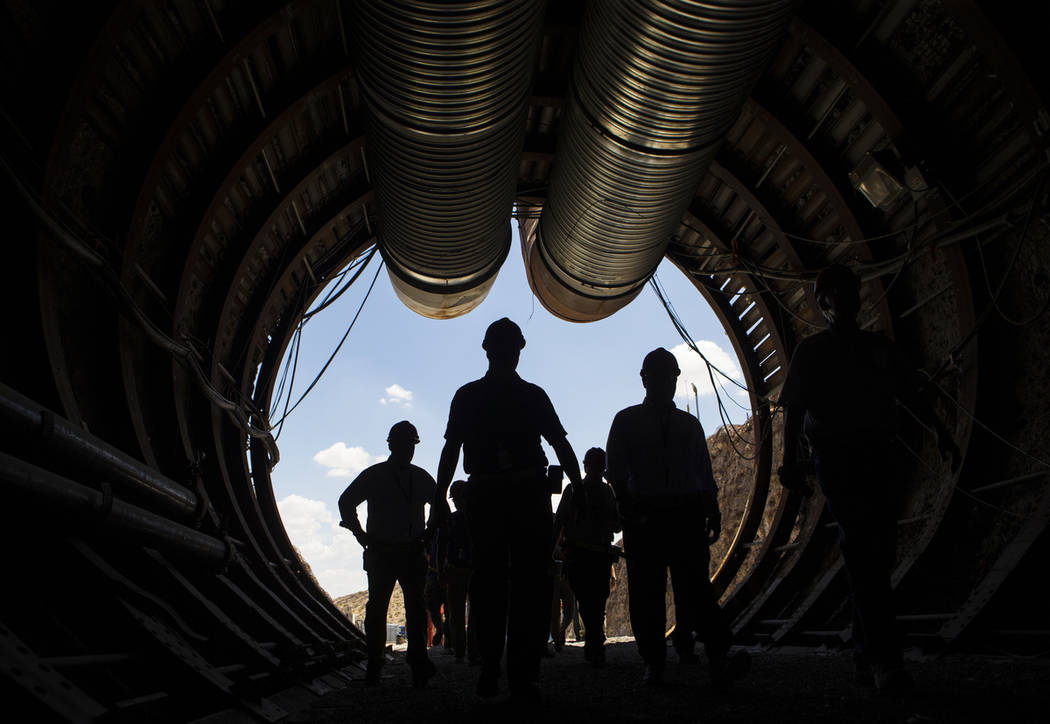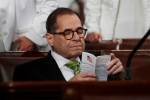Nevada delegation wins one battle on nuclear waste funding
WASHINGTON — Nevada opponents of a nuclear waste repository at Yucca Mountain scored a victory Tuesday when a House committee turned away an attempt to put money behind an effort to restart the process of licensing the project.
The House Appropriations Committee voted 25-27 to shoot down the amendment by Rep. Mike Simpson, R-Idaho, to add $74 million to the bill, less than the $116 million sought by the Trump administration to revive the hearings on the Energy Department’s application to build the repository. The overall bill appropriates $46.4 billion for various purposes.
The only Nevada lawmaker on the committee, Rep. Mark Amodei, a Republican, voted against the Simpson amendment and with Democrats who were muscled by House leaders to vote against Yucca Mountain funding.
“If you are just offering me an up-or-down vote on a nuclear landfill, I’m a no,” Amodei said, noting that the amendment did not include concessions for Nevada as did previous bills that gave the state oversight, research programs at state universities and a voice in routing the material.
Simpson pleaded with members on both sides of the political aisle to vote for the amendment, noting that many had nuclear powered generating plants in their states.
He said that with a vote against his amendment, “you are voting to keep nuclear waste in your districts.”
Behind the scenes, House Speaker Nancy Pelosi, D-Calif., twisted arms on the vote following a meeting two weeks ago with Nevada Democrats Dina Titus, Steven Horsford and Susie Lee.
The Nevada delegation also was aided by Rep. Nita Lowey, D-N.Y., chairwoman of the Appropriations Committee.
Victory for Nevada
Nevada lawmakers claimed victory in a battle that will now move to the Senate.
“The latest attempt to force nuclear waste down Nevada’s throat has failed, and I won’t stop fighting until we put and end to Yucca Mountain once and for all,” Titus said.
Horsford called it a “victory for all Nevadans.”
“While we won today, the fight isn’t over,” Horsford said.
The Appropriations Committee and the full House voted overwhelmingly in the past Congress to revive licensing on the repository, only to see legislative efforts die in the Senate.
President Donald Trump had been seeking $116 million to restart licensing on the Department of Energy application to build facility, as well as to study interim storage at other sites, in his fiscal year 2020 budget, which begins Oct. 1.
Lowey, D-N.Y., and Rep. Marcy Kaptur, D-Ohio, who heads the energy and water subcommittee, were instrumental in crafting a compromise House and Senate spending bill for this fiscal year that provided financial assistance for communities with decommissioned nuclear power plants and stockpiled waste.
That bill, for fiscal year 2019, did not include money for Yucca Mountain.
As the appropriations process for 2020 began, Titus testified before Kaptur’s subcommittee in March against moving nuclear waste across the country and storing it at a site that could pose a risk of groundwater contamination.
The subcommittee also heard testimony from Rep. John Shimkus, R-Ill., who used the Energy Department’s 16-volume safety analysis and the Nuclear Regulatory Commission safety report to bolster his argument that the Nevada site would be a secure repository for nuclear waste.
Officials in Nye County, where Yucca Mountain is located, also support the building of a repository, as well as nuclear industry organizations, trade unions and the U.S. Chamber of Commerce.
The state of Nevada, environmentalists, Las Vegas business leaders, state tribal officials and the gaming industry opposes storing the nation’s nuclear waste.
Gov. Steve Sisolak and state Attorney General Aaron Ford are directing a statewide effort to stop federal efforts to build Yucca Mountain in a state with a $40 billion tourism industry.
If licensing hearing resume, Nevada has 218 challenges to the application.
Big guns on Nevada’s side
Meanwhile, Titus, Horsford and Lee met with Pelosi this month seeking her help to stop funding for Yucca Mountain.
Pelosi apparently gave assurances she would help, according to a senior congressional aide familiar with the meeting.
After the subcommittee bill slashed funding, Titus said, “This fight is far from over, but I’m encouraged by the support on our side.”
Simpson’s amendment only included $74 million due to committee rules that require offsets, or cuts, in other parts of the bill, in order to put new spending into the legislation.
Opponents of Yucca Mountain faced steep odds before the vote. There are only five members of the 53 lawmakers on the Appropriations Committee who do not have spent fuel in their states.
And the House approved authorization legislation to jump-start Yucca Mountain hearings in the last Congress by a large bipartisan majority and a 340-72 vote.
Although that bill died after the last Congress for lack of Senate action, a new bipartisan version of the legislation was filed this month in the House, to be taken up later by the Energy and Commerce Committee.
In addition, two Senate bills have been filed that include Yucca Mountain as part of plans to address the growing stockpile of nuclear waste and a decades’ long impasse on building a repository in Nevada.
Congress designated Yucca Mountain in 1987 as the sole site for permanent nuclear storage.
Licensing hearings were defunded in 2012 by the Obama administration.
The Trump administration has requested funding to revive the hearings in each of its past three budget proposals.
Contact Gary Martin at gmartin@reviewjournal.com or 202-662-7390. Follow @garymartindc on Twitter.





























